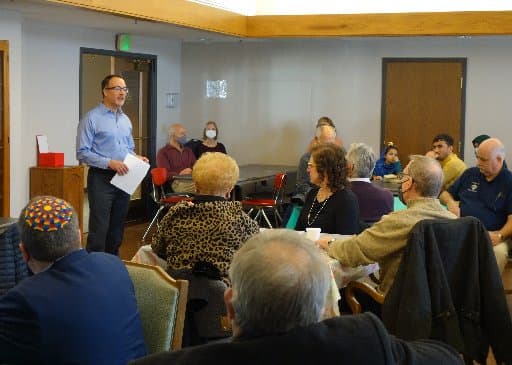FORT WAYNE, Indiana — They gave of their time for different reasons. Their work transformed an unused former nursing home into Catholic Charities’ new Cabrini Center, which will offer temporary housing and resettlement services to Afghan refugees starting a new life in Fort Wayne.
“Volunteers were instrumental in every piece of getting this open,” said Nicole Kurut, mission advancement manager for the Catholic Charities office serving the Diocese of Fort Wayne-South Bend.
The social service ministry welcomed back those volunteers Jan. 20 for a thank-you luncheon at the Cabrini Center.
The event included a blessing of the building by Father Mark Gurtner, vicar general of the diocese, a lunch of Afghan food and tours of the finished facility. Volunteers also had a chance to meet a few Afghan families staying there, the first of whom arrived in mid-January.
Catholic Charities named the center after St. Frances Xavier Cabrini, the patron saint of immigrants and first American citizen to be named a saint. Born in Italy, Mother Cabrini came to the U.S. in the late 1800s to minister to the thousands of Italian immigrants who had arrived in America before her.
She and the religious order she founded, the Missionary Sisters of the Sacred Heart of Jesus, aided those in need by opening schools, orphanages and hospitals.
The sisters’ mission is to bring Christ’s love to the world, which fits well with the work Catholic Charities will do at Cabrini Center, Dan Florin, local Catholic Charities interim CEO, said during brief remarks at the luncheon.
The need for a space like the Cabrini Center sprang up in late August as U.S. troops started their final withdrawal from Afghanistan. The Afghan military and government collapsed before U.S. personnel could exit, leaving the country under the control of the Taliban.
A U.S. airlift carried more than 100,000 Afghan refugees out of the country before troops left.
Most of these refugees were taken to one of several military bases in the U.S., including Camp Atterbury, an Indiana Army National Guard base just south of Indianapolis. About 40,000 Afghan refugees remain at military bases overseas, Kurut said. Those still overseas are scheduled for future resettlement in America.
At the time Afghan refugees began arriving in America, Fort Wayne had little housing available, Kurut said. So Catholic Charities looked for other ways to accommodate some of the new arrivals.
The Fort Wayne-South Bend Diocese already owned the building that now is the Cabrini Center. The original portion was constructed in 1958 as a convent for religious sisters, Florin told Today’s Catholic, the diocesan newspaper.
It later became a nursing home but basically had been unused for a year or more when Catholic Charities took possession of it in October, Kurut said.
Volunteers from Allen County, the nearby city of Warsaw, Indiana, and places in Ohio swarmed in to clean up the interior and remove items left from its previous use, Kurut said.
They unboxed and sorted donations of clothing, kitchen items, bed linens and other things the families will need to set up their own households. They set up rooms for use by Afghan families, who can stay there 30 to 60 days while Catholic Charities help them find housing of their own.
Other volunteers included members of Knights of Columbus Council 451 at St. Charles Borromeo Parish in Fort Wayne and members of the Carpenter’s Sons, a ministry of the Society of St. Vincent de Paul of Fort Wayne.
The Afghan resettlement project also became an interfaith effort, with congregations from other religious denominations in the Fort Wayne area holding fundraisers or organizing other activities to assist Catholic Charities, Kurut said.
“None of this would have been possible without our volunteers,” she emphasized.
As of Jan. 20, the Fort Wayne Catholic Charities office had assisted 101 Afghan refugees with resettling in the Fort Wayne area, Florin said. The agency expected to resettle about 125 Afghans total in the area.
Catholic Charities also recently opened a refugee resettlement sub-office in South Bend, Kurut said. It will welcome 30 Afghanistan refugees to that area before moving into resettling refugees from other nations.
Helping newly arrived Afghan families poses new challenges for Catholic Charities, Kurut said. The families had to flee their own country suddenly rather than working through the process of coming to America during years in a refugee camp.
Families frequently are large, consisting of several members. Many adults worked as physicians, lawyers and in other professions in their homeland. Those who choose to resume their careers in America will have to pass the required exams and licensing standards.
The Cabrini Center will be a hub for assisting Afghan refugees with building a new life.
In addition to serving as interim housing, the center will have case managers on site to assist families with government services paperwork and various sign-ups, such as enrolling children in school, Kurut said.
The center will provide families with English as a Second Language classes and job development training. Entertainment and activity areas will allow refugees to meet and make friends with other Afghan families being resettled in the area.
Volunteers will provide homework help to children and mentor adults as they adjust to their new community and culture, Kurut said.
– – –
Kilbane is a freelance writer for Today’s Catholic, newspaper of the Diocese of Fort Wayne-South Bend.












